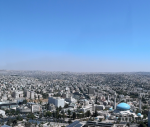You are here
The Economic repercussions of the war on Gaza
Nov 17,2023 - Last updated at Nov 17,2023
There is a broad consensus regarding the adverse impacts of the Israeli occupation forces’ war on Gaza, both on the Palestinian economy and the economies of the surrounding region. Similar to economies worldwide, this region has faced a series of successive shocks in recent years, starting with the outbreak of the COVID-19 pandemic, followed by the effects of climate change and even extending to the Russian-Ukrainian war. However, the blockade imposed on Gaza 17 years ago has been particularly devastating, leading to the collapse of its economy. Similarly, the economy of the West Bank has faced significant challenges due to the obstacles imposed by the occupation.
A report, jointly published two decades ago by several reputable international organisations (including the World Bank, the International Monetary Fund and the United Nations Trade and Development Organisation (UNCTAD), sounded the alarm about the dire consequences of allowing the Palestinian territories to plunge into crises and poverty. Unfortunately, over the years, the living conditions in both the West and the Gaza Strip have deteriorated significantly. The situation in the Gaza Strip, in particular, has worsened due to the imposition of an Israeli blockade after Hamas took control in 2007.
Therefore, it can be said that prior to the “Al Aqsa Flood” operation carried out by Hamas against Israel on 7/10/2023, coupled with the subsequent declaration of war on Gaza, the economic situation in the West Bank, particularly in the Gaza Strip, was very difficult. As per the findings of the World Bank, the economy of Gaza experienced a contraction of 2.6 per cent in the first quarter of this year. This decline can be attributed to a substantial downturn in the agricultural and fishing sectors, where a decrease of 30 per cent was observed, resulting from the occupation authorities’ decision in August 2022 to impose restrictions on the sale of Gaza fish in the West Bank.
Examining the employment situation in Gaza, all metrics present a cause for great concern. Data provided by the World Bank reveals an unemployment rate of 46.4 per cent (equivalent to approximately 245 thousand individuals), among the youth, this rate reached an alarming 60 per cent. Moreover, a staggering 83 per cent of the working population in Gaza receive wages below the minimum acceptable threshold. As a result, more than half of the population lives below the poverty line, while two-thirds of households in this coastal enclave battle food insecurity. In comparison to Gaza, the situation in the West Bank can be characterised as relatively less severe. The unemployment rate in the region stands at 13 per cent, and approximately, 23 per cent of the population experiences food insecurity. However, the West Bank’s economy faces significant challenges due to restrictions imposed by the occupation forces, including the presence of numerous checkpoints and laws that curtail the freedom of movement for individuals. Israel accounts for 70 per cent-80 per cent of the West Bank’s exports and imports, further exacerbating its economic dependency.
One can easily anticipate the impact of the war of extermination and starvation on Gaza’s people’s livelihoods and the reality of the aforementioned figures. Khaled Assili, the minister of national economy of the Palestinian government, noted that according to the statistics of 2022, the number of industrial and commercial establishments in the Gaza Strip reached 50,000 establishments, varying from factories to shops in local markets. Unfortunately, these establishments have become targets of Israeli missile attacks, resulting in unprecedented losses in the history of military operations in the region.
Assili highlighted that since 7/10/2023, factories have closed their doors, while the Palestinian ministry of economy lacks any statistics on the extent of the destruction, due to the ministry’s limited mobility. Assili further stated that “streets no longer exist, nor do sewage networks, and, most significantly, Israel targeted the deteriorating electricity infrastructure. Gas and fuel supplies have depleted, while the labour force struggle to secure shelter for their families.”
The latest assessment of the Israeli aggression on Gaza (as of Friday, 27/10/2023) indicates unprecedented figures that depict the scale and the magnitude of killings and destruction. The number of martyrs exceeded 11,000. Furthermore, the number of displaced individuals reached 1.5 million, partial damage was incurred by 190,000 residential units, while 29,000 units became uninhabitable. Additionally, 189 schools were damaged, 38 mosques were completely destroyed, and three churches suffered significant damage, according to the Palestinian ministry of health and the Gaza government office.
In conclusion, it is of paramount importance for this savage war, whose objectives extending beyond military targets to the destruction of the social and economic infrastructure and render the Gaza Strip uninhabitable, to cease. In this regard, His Majesty King Abdullah reaffirmed Jordan’s unwavering position in rejecting any attempt to displace the Palestinian people from their lands. His Majesty considered the denial of food, water, and electricity to innocent civilians in the Gaza Strip as a “war crime” that the international community must reject. His Majesty also stressed the necessity of opening humanitarian passages to facilitate the urgent medical and relief assistance to the Strip, calling for stopping the war on Gaza and preventing its spread to the West Bank, to mitigate their destabilising consequences on the broader regional security landscape.
Michael Sweidan is dean of the Faculty of Business at the Yarmouk University§












Add new comment